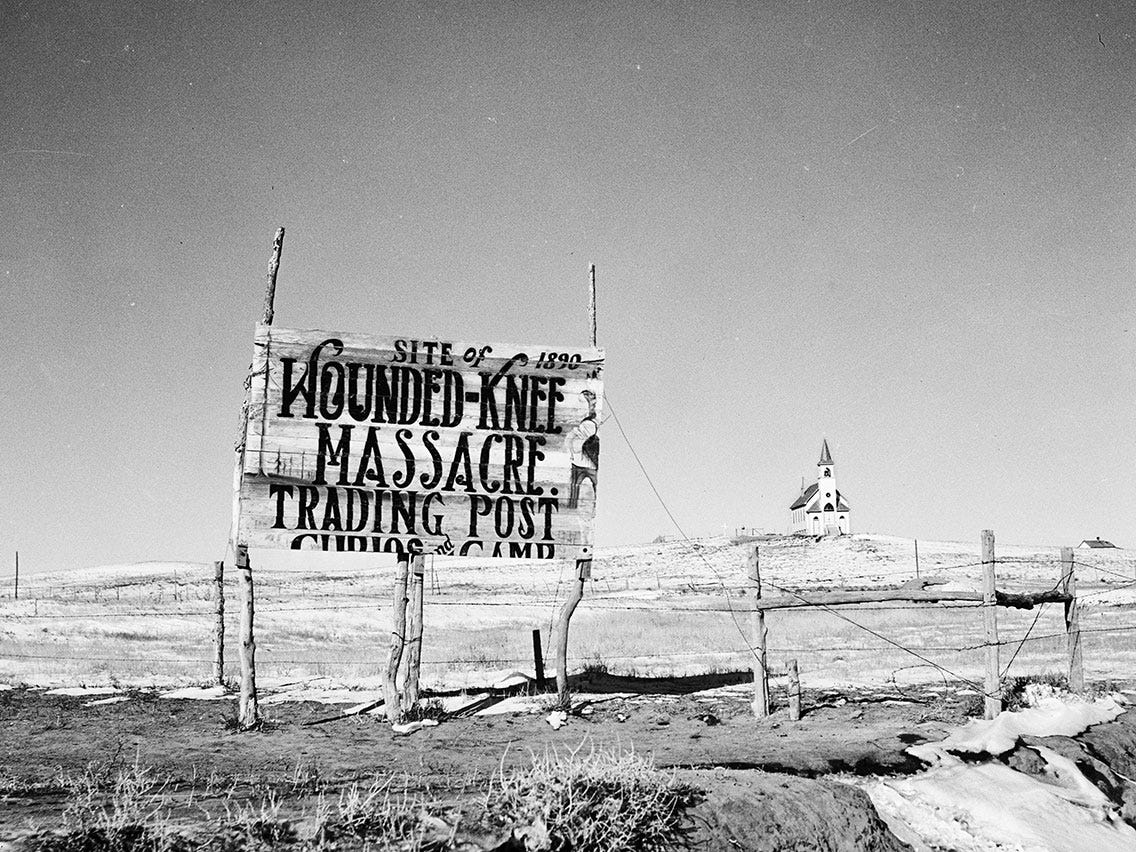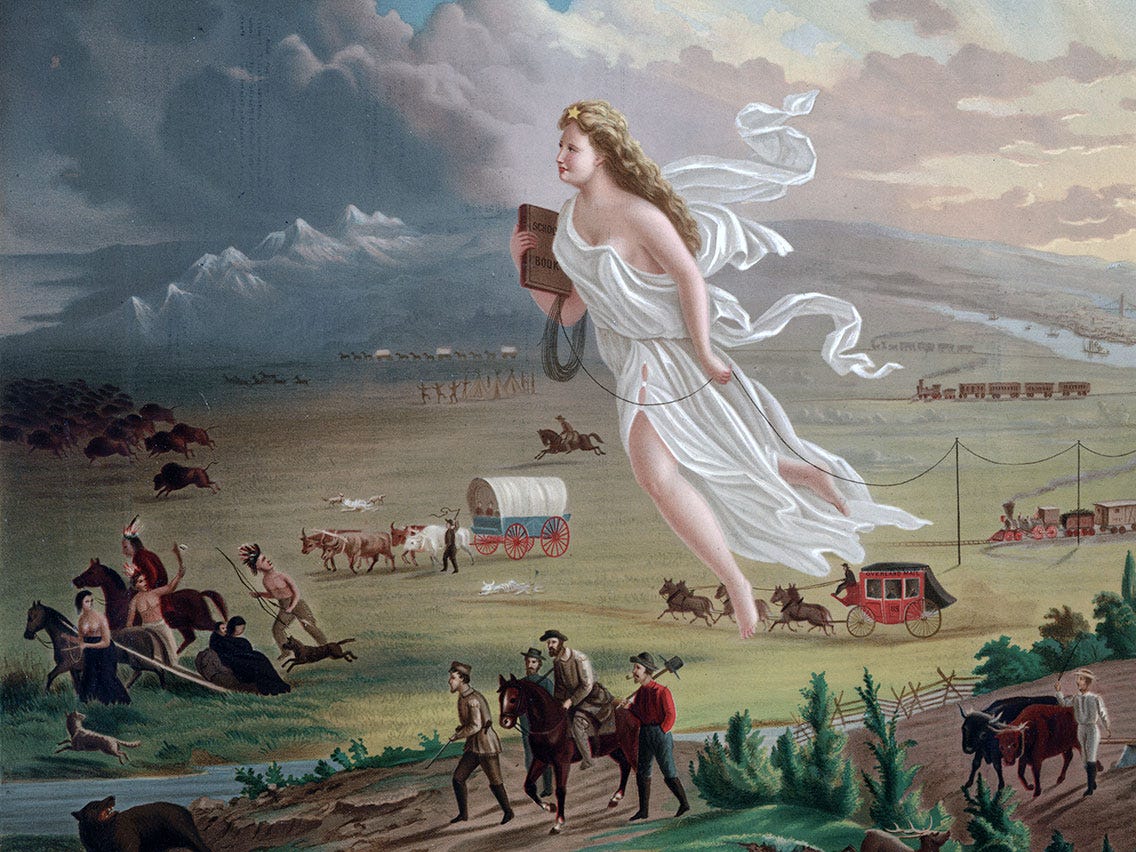Immigrants or Settlers?
Rethinking American Roots: Settler Colonialism vs. Immigrant Nationhood
In these increasingly xenophobic times, my friends like to say “We are a nation of immigrants!”
What they are trying to say is that we, the inhabitants of the USA, are a diverse people from many different places, that the United States is a welcoming, accepting place, that aside from the indigenous people, almost all communities in the U.S. have immigrant roots.
It’s a well intentioned statement, although it erases the experiences of Native Americans and the effects of forced migration, such as the transatlantic slave trade.
It’s also wrong.
We are not a nation of immigrants. We are a nation of settlers.
“Settlers are not immigrants. Immigrants are beholden to the Indigenous laws and epistemologies of the lands they migrate to. Settlers become the law, supplanting Indigenous laws and epistemologies. Therefore, settler nations are not immigrant nations,” Eve Tuck and K. Wayne Yang write in their foundational 2012 paper “Decolonization is not a metaphor”.
I make this argument to a friend.
He replies “But the usa is both… it began as a colonial settlement but evolved into a nation of immigrants. Both are true…There is a larger percentage of the population in the usa who are NOT descended from colonial settlers. The Irish, Italians, etc.,” which, of course, includes him. His family originates from Eastern European Jews who migrated in the early 20th Century.
Nope.
If the settler colonial state had transitioned back into an indigenous nation, or nations, exercising indigenous sovereignty, and the immigrants were invited and beholden to the indigenous laws, then yes, we would be a nation of immigrants. But that didn’t happen.
My friend defines colonialism as an event that began with the arrival of the Pilgrims and the formation of the colonies and ended with the American Revolution, when the United States ceased to be colonies.
He doesn’t consider anything that happened after 1776 to be colonization.
He does not understand that colonization does not necessarily require that the colonized territory formally become a colony. A colony is a specific political structure where a territory is governed by a foreign power. However, colonization is a broader process and can take various forms beyond the establishment of formal colonies.
My friend texts me “My US history isn’t the best, but I think the 1800’s was the westward expansion and all the cowboys & indians stuff and the railroads.”
He doesn’t recognize Manifest Destiny as colonization because it happened after US independence from Britain, and did not involve the direct descendants of the original colonists. He does not for a moment consider indigenous people when discussing colonialism. The land might as well have been empty before the settlers arrived. All that matters to him is the relationship between the settlers and their nation of origin. But Manifest Destiny is rooted in a sense of American cultural and racial superiority and provided a moral justification for the U.S. expansion westward. It was used to justify the displacement and violent removal of Indigenous peoples from their lands, the annexation of territories, and the war with Mexico, all of which are characteristic of colonial practices.
Settler colonialism is not an event. It is a system.
We are not a nation of immigrants because settler colonialism is not an event. It is a system. A structure.
And Manifest Destiny offers a blueprint of settler colonialism.
My friend continues “So the evils of colonial conquest have been diluted by immigrant populations that followed the settlers.”
Tell that to the indigenous population, what’s left of them.
Patrick Wolfe’s seminal work “Settler Colonialism and the Elimination of the Native” discusses the structural nature of settler colonialism and its primary objective: the elimination of native societies. Wolfe asserts that settler colonialism requires the elimination of indigenous people, either through physical extermination (genocide) or dissolution of indigenous societies and territories and their replacement with a new settler society. This is done through a variety of means such as direct violence, genocide, biological assimilation, intermarriage, and cultural assimilation.
Tuck and Wang state “The violence [of settler colonialism] is not temporally contained in the arrival of the settler but is reasserted each day of occupation.”
When my friend writes “I don’t say that to invalidate the wrongs of colonialism but…the evils of colonial conquest have been diluted by immigrant populations that followed the settlers...the westward expansion and all the cowboys & indians stuff and the railroads.” he is suggesting that events like the Wounded Knee Massacre (1890) where 300 Lakota, mostly women and children, were attacked and slaughtered on the Pine Ridge Indian Reservation in South Dakota, the Sand Creek Massacre (1864) in which a peaceful village of Cheyenne and Arapaho was attacked and 700 mostly women and children slaughtered and mutilated, the Marias Massacre (1870) in which a friendly camp of Piegan Blackfeet Indians in Montana was attacked and 200 Piegan, mostly women, children, and elderly, were killed, and countless others including the California Genocide, are not the “evils of colonial conquest” but just immigrants doing immigrant stuff while trying to make better lives for themselves.
The folks who arrived “as immigrants” after the original colonialists – the Germans, the Irish, the Italians, the Jews, became settlers in the United States. It doesn’t matter if they were fleeing poverty or persecution in Europe.
Yes, you can be a refugee and a settler at the same time.
Why did settlers want to eliminate natives? According to Wolfe, the primary reason settlers seek this “elimination” is land. Settlers aim to acquire land and resources for their own use, and indigenous peoples’ existing ties to the land pose a challenge to settler claims. Thus, the settlers seek to remove or erase indigenous presence, thereby legitimizing their claims and establishing their own sovereignty.
Land is essential for the establishment and continuation of settler colonial society. This process is inherently tied to the formation of a new settler identity and nationhood, replacing the indigenous societies and territories.
This removal was often violent, bloody, and involved the slaughter and mutilation of elderly people, women, and children. Other times, it involved making treaties with indigenous people and then promptly breaking them, forced assimilation through Indian boarding schools, the destruction of culture and language (aka cultural genocide)…
Four hundred years after the Pilgrims landed at Plymouth Rock, and 247 years after US Independence, these processes of indigenous elimination remain ongoing. They are not historical events that have ended, but structural processes that are continually reinforced. The Supreme Court just ruled on two cases last week, one involving the Indian Child Welfare Act and forced adoption of indigenous children by white people, and the other involving access to water on the Navajo reservation, where a third of houses are without running water or electricity.
This is still a settler colonial nation. It never stopped being one.



